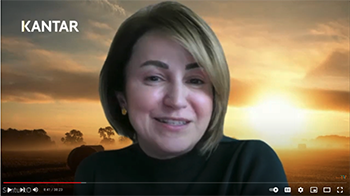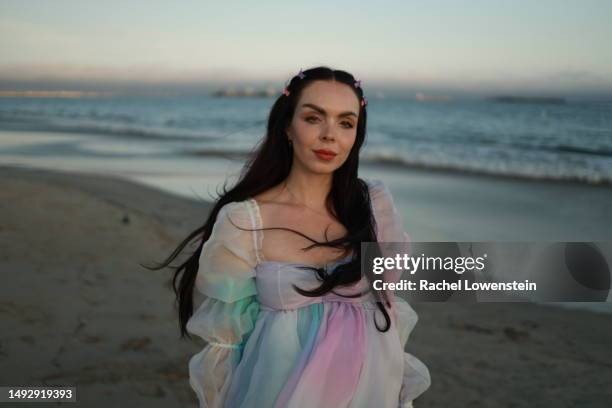
The WFA, with Kantar Research, Offers Imperatives on Marketers’ Role in Sustainable Actions. Özlem Şentürk Explains…
The World Federation of Advertisers has been proactive in linking sustainability with marketing imperatives. From the launch of their Planet Pledge to recent conversations about the Green Hush, the WFA continues to provide marketers worldwide with ways to consider climate action.
At their annual Global Marketer Week Conference in late April, they took another important step with research in partnership with Kantar’s Global Sustainable Transformation Practice. Entitled Sustainable Marketing 2030, the study highlights the current gap between intention and action on sustainable marketing practices and innovation. Furthermore, the results consider the critical role marketing can play as businesses continue to transform to satisfy climate concerns.
Özlem Şentürk, Senior Partner at Kantar for their Global Sustainable Transformation practice, presented the research. She believes that the key to sustainable marketing lies in advocating and adopting circular principles. Based on the WFA/Kantar findings, the circular marketing growth framework is designed to reimagine marketing’s role in both business and society, while marketing becomes part of the sustainability solution. Clearly, marketers can drive new sustainable behaviors – both within their organizations and more broadly to all company constituents.
Sustainable Marketing 2030 specifics suggest that marketing is not changing fast enough in sustainability and needs to catch up with other business areas. In fact, the results show that just 39% of marketers worldwide are only taking the first steps in their sustainability journeys.
Fortunately, Sustainable Marketing 2030 identifies a significant ambition to transform with 90% of marketers agreeing that sustainability agendas must be more ambitious. A huge 94% say that marketers need to act “bravely” and experiment to drive transformative change. In fact, 43% of brands now have sustainability as a KPI as part of their marketing dashboards.
Despite concerns about greenwashing accusations, 82% of those surveyed admit they must do more to communicate their sustainability efforts. Interestingly, the research also shows that 41% of brands now say they have a sustainability story that they are proud to share. More than half (54%) agreed with the need to educate people about their sustainability choices and actions.
The challenges to adopting sustainable practices among marketers were largely identified as broad organizational issues:
- Lack of internal resources- 35%
- Knowledge and skills gap- 35%
- Lack of a P&L policy that protects the planet- 35%
- Organizational mindset (sustainable solutions are perceived as costly)- 32%
- Lack of transparency in measurement- 30%
To learn more from Özlem Şentürk as she discusses a series of thought-provoking topics– from product innovation to circular frameworks to recognition that current concepts of growth may have to be reconsidered if businesses aim to be compatible with a sustainable future, watch the video interview on Internationalist Marketing TV (IMTV) on YouTube by CLICKING HERE.

Subscribe FREE to Internationalist Marketing TV on YouTube to get notifications of new videos.
In our conversation, we discuss the following:
- What did the research tell us in terms of how marketers are responding to issues of sustainability?
- What about the challenges they say they face, or perhaps their fears given current “accusations” of greenwashing in advertising or communications?
- Did you find that a majority of marketers had certain aspirations on the topic of sustainability?
- Were you surprised by any of these results?
- How are you interpreting the survey results in terms of a path forward for marketers on sustainability?
- From what I’ve seen from the survey, there may be a gap between intention and action. I’ve noticed this before with broader issues of purpose in terms of the difference between stating a mission and then acting on it… How does a marketer help an organization close that gap?
- What would you, as a senior partner at Kantar- dedicated to sustainable transformation, recommend to marketers today in terms of their duties toward sustainable actions on behalf of their organizations?
- What do you see as the next trends in terms of marketers’ responsibilities and the increasing aims of sustainable transformation?

To hear more from Özlem Şentürk as she discusses a series of thought-provoking topics– from product innovation to circular frameworks to recognition that current concepts of growth may have to be reconsidered if businesses aim to be compatible with a sustainable future, listen to the podcast as part of our Trendsetters Podcast series on iHeartRadio’s Spreaker.
The World Federation of Advertisers (WFA) is the voice of marketers worldwide and champions responsible and effective marketing communications. Their annual Global Marketer Week was held in Istanbul, Turkey from April 25-28. This research, with Kantar, was presented at the event. Kantar is the world’s leading data, insights, and consulting company.
Özlem Şentürk has been leading assignments across a broad range of industries– from technology and services to classical FMCG—for more than 15 years. Her greatest passion as a consultant is to drive impact. She believes people are the biggest asset to make that impact sustainable. As a Kantar sustainable transformation global expert, she has been a consultant to companies across the globe on their sustainable/purpose-led transformation journeys.
Özlem started her marketing career at Procter & Gamble in Turkey and continued with global innovation and category leadership roles within the consumer electronics sector in the Netherlands before joining Kantar. She has an MBA from NIMBAS Business School (University of Bradford) and a BSc from the METU university in Turkey.



